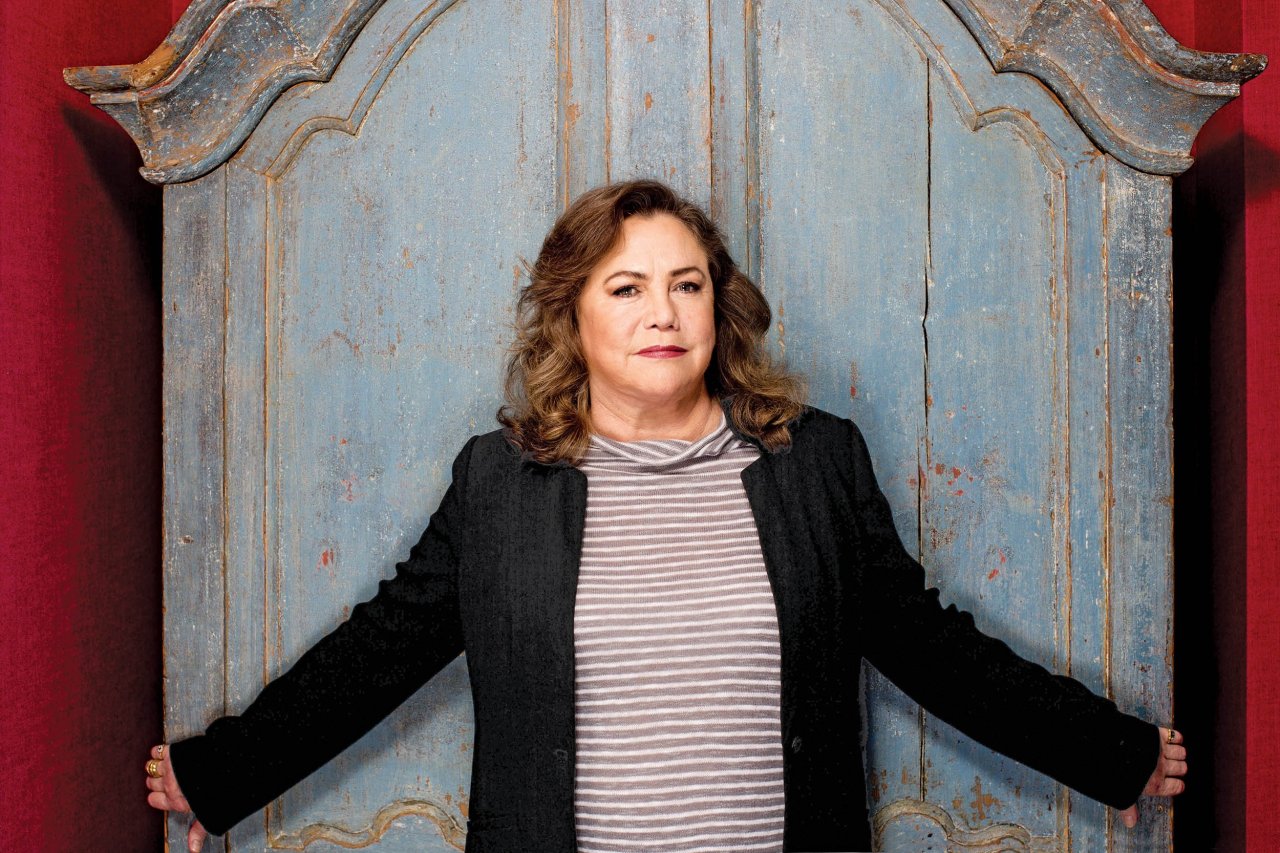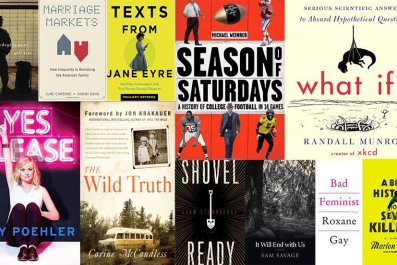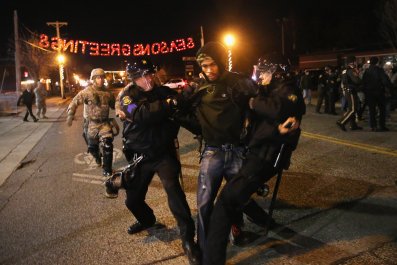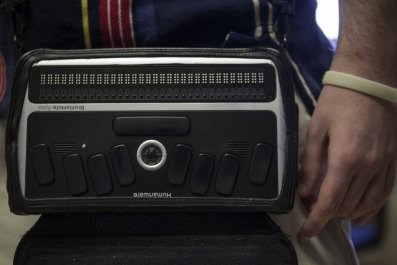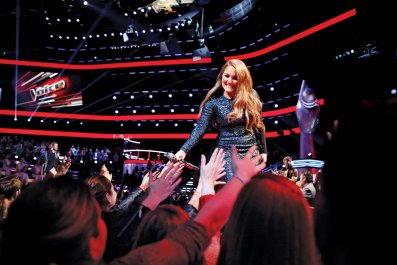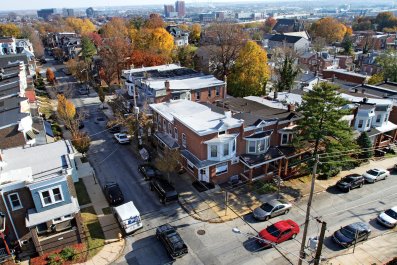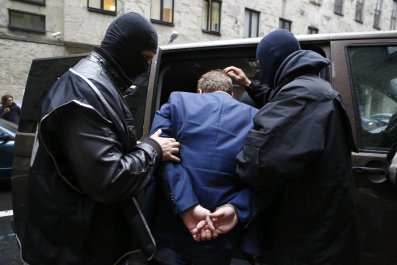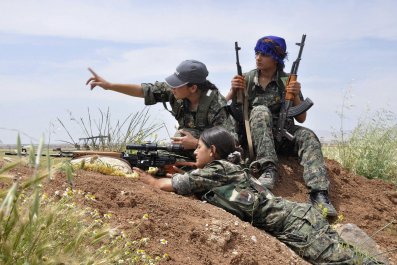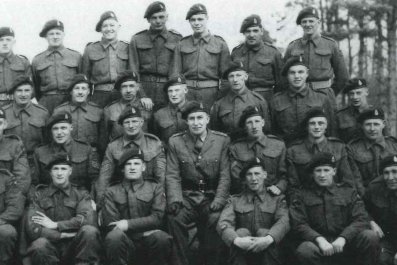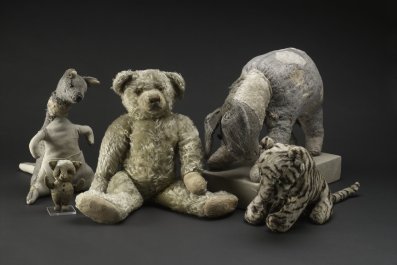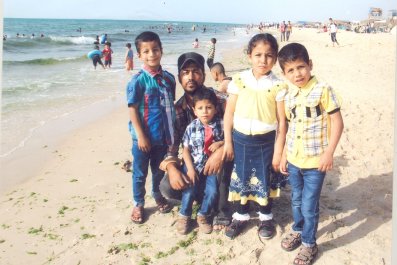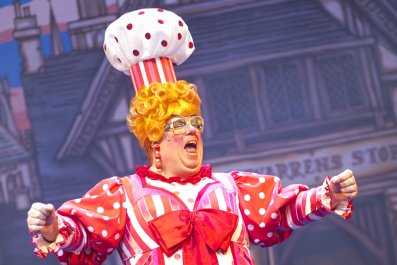Kathleen Turner was 25 when she was cast as the femme fatale in Body Heat, Lawrence Kasdan's 1981 warmed-up film noir in which Turner's character gets chump William Hurt to do her dirty work. She had been in New York for a few years, doing soaps and waiting tables, when she went to Florida for the shoot.
"So I come back to New York and I'm broke, and I go back to waitressing," she says in her husky growl. "I went back to the restaurant where I had worked before, and they said, 'Where have you been? We haven't seen you in months.' 'Yeah, well I was shooting a film.' And they said, 'Oh, wow! You got a film! What's it called?' 'Body Heat.' And they go"—at which point her face falls in a look of embarrassment and pity—"It had to be a porno."
We're talking in an office above the Berkeley Rep theater, where Turner is playing a dangerous woman of a different sort, the late Texas liberal journalist Molly Ivins in a one-woman show called Red Hot Patriot: The Kick-Ass Wit of Molly Ivins. The path from Hollywood stardom to the rep theater circuit was less precipitous and more consciously chosen than it might appear. She was the It girl, the object of desire for another 10 years after Body Heat made her a star (signature moment: Hurt, in heat, smashing a plate glass door to get to Turner), finally parodying herself as the voice of Jessica Rabbit in Who Framed Roger Rabbit ("I'm not bad; I'm just drawn that way"). But unlike some who've worn that costume before her, she checked the use-by date on the label.
"I don't think it was ever very real to me," she says. "I had great times. I loved Romancing the Stone, I loved every film but one." Do tell. "Switching Channels. It was supposed to be with Michael Caine. I ended up with Burt Reynolds."
Talk about your bait and switch! Sometime life hands you lemons. Hers have come in the form of rheumatoid arthritis (she padded around the stage in slippers as Martha in her Tony-nominated performance as Martha in a revival of Who's Afraid of Virginia Woolf? because she'd lost toe bones to the disease), divorce (from New York real estate entrepreneur Jay Weiss), battles with alcohol. But her escape from the Hollywood illusion was always lit with stage lights (her first role after Body Heat was as Titania and Hippolyta in A Midsummer Night's Dream).
"I always knew that I wasn't going to be wanted on film after a certain fading of sexual allure or whatever," she says. Turner is dressed comfortably in a sweatshirt and jeans hours before her first preview performance here. If she has any butterflies, they are drowned out beneath that brass instrument of hers. (The play had a sold-out run in Washington, D.C.'s Arena Stage in 2012.) "And the great roles onstage! Doing Martha, doing Mother Courage [in Brecht's play of the same name], my God! There's no film [role] comparable to those."
Her take on Edward Albee's best-known ballbreaker, on Broadway in 2005, made believers of the theater world. "I have earned my place," she wrote of playing Martha in her memoir, Send Yourself Roses, and Broadway agreed: Cherry Jones, who won the Best Actress Tony (for her role in Doubt) that year, said in her acceptance speech that the award belonged to Turner. New York Times theater critic Ben Brantley was more specific in his review. "When she sits at the center of the stage quietly reciting a litany of reasons she loves her dearly despised husband," he wrote, "you feel she has peeled back every layer of her skin to reveal what George describes as the marrow of a person."
Part of what made her performance such a revelation was that she saw Martha in the context of the time and setting, 1960s American academia. "She doesn't have any standing other than as her father's daughter or her husband's wife," she wrote. And it was her insight into the character (played as such a shrew by Elizabeth Taylor in Mike Nichols's 1968 film version), plus her insistence that the play was a comedy, that compelled the reluctant Albee to allow her to perform the part.
When we meet, I tell Turner I had just heard a recording of Nichols, who had died a few weeks earlier, quoting a famous gag about teaching: "One of the reasons people fight so much in academia is that the stakes are so small."
"Oh, I like that," she says, and adds that she had just seen Nichols and his wife, Diane Sawyer—"We were at a tea for Tom Stoppard." (And that's how her life is different from yours.) Turner has taught acting herself, at NYU and other universities and does periodic stints with the New York–based One on One school, where her advice, as always, is practical. "This is not for students but for people who are out there trying to get a job," she says. "In college, the course is called Practical Acting: Shut Up and Do It. Once you've graduated, it's called Get the Fucking Job."
Acting was not the job her family would have chosen for her. Her father was in the foreign service (as a child she lived in Canada, Cuba and Caracas) and thought acting was just one step away from streetwalking. "He grew up in China," she says. "My great-grandfather was a missionary. My dad was brought up by two Victorian maiden aunts, and this simply had never come into his sphere.… It was just unthinkable. There was no one in my family ever connected to the arts in any way."
Turner's father died when she was a teenager, and her family moved to Missouri, where her mother's parents were. She attended Southwest Missouri State University, and "the first year I was there I was either in rehearsal or onstage for all but 14 nights," she recalls. "That's how you learn acting. So go to a school where you are on stage all the time. As opposed to a conservatory or something where they tell you, well, when you're a junior you'll get to [be on stage]."
This was also the beginning of her involvement with Planned Parenthood, one of several causes she devotes enormous amounts of energy to. "I think I was probably a very late bloomer, certainly by today's standards," she says. "But when I did realize that I was going to need contraception and access to more intimate health care, that was the only place I could go, the clinic. We didn't have money for a private doctor. I was a starving student. And I'm just endlessly grateful. I think it's all payback."
Her paths and Ivins's crossed on the political circuit over the years. The journalist-humorist, perhaps best remembered for bestowing on George W. Bush the indelible nickname "Shrub," was active in some of Turner's other causes too (People for the American Way, the ACLU). It was late in Ivins's life (she died of breast cancer in 2007) that the actress and the firebrand spent time together. "Ann Richards took an apartment in my building in New York when she was undergoing her final treatments [the former Texas governor died of esophageal cancer in 2006]. So I walk into the lobby one day, and Ann and Molly are waiting for the elevator. And they look at each other, and they look at me, and they say, 'You're coming with us.'"
The play is rather thin soup; Turner does not attempt an Ivins impression (she was an infrequent presence on television and was fired from 60 Minutes for essentially being herself) but struts the stage in cowboy boots, blasting off some of the writer's better lines. Her epitaph, Ivins said, should read: "She never made a shrewd career move." As for Bush's lauded (and completely undocumented) proficiency in Spanish, she said, "He's not bilingual, he's bi-ignorant."
The Berkeley crowd loves it, though, as they did in D.C., and the show's run has been extended into January. Of her new home, for a few weeks at least, Turner is a little more trepidatious. She's a committed New Yorker. "I've been encountering a little attitude, I thought," she says, just a week into her stay. "I get a sense that people here are just so pure. I'm kind of like, Come on, guys; if it isn't organically sourced, you won't die."
This from a woman who knows what will kill you.



